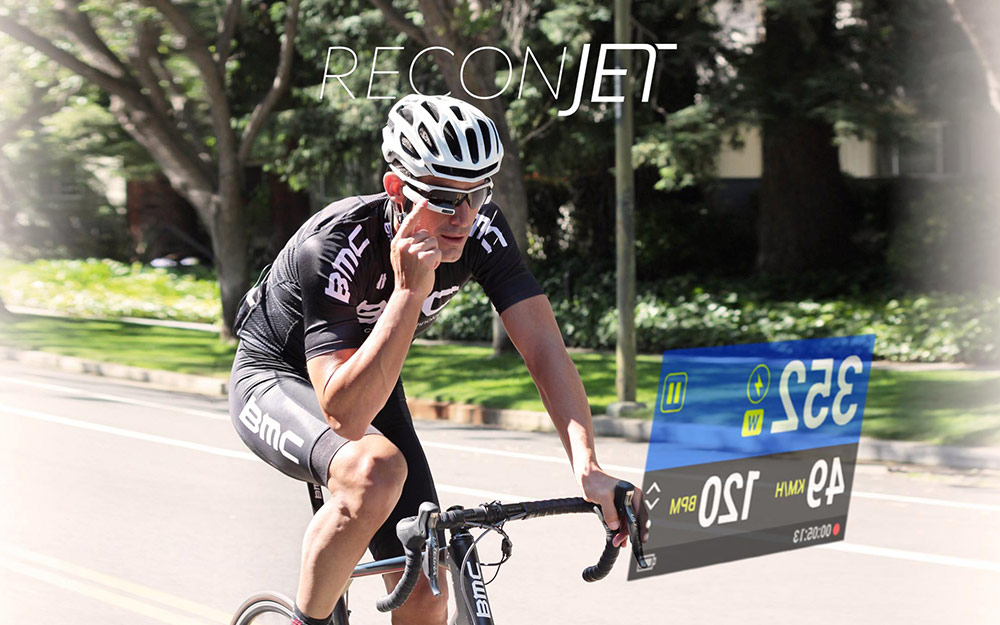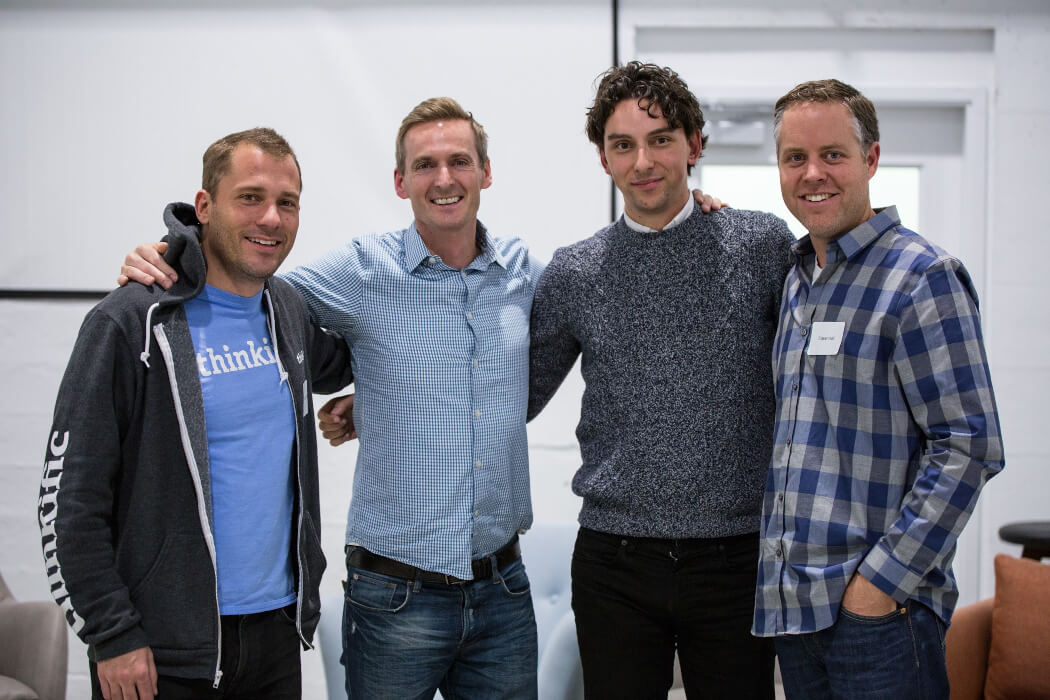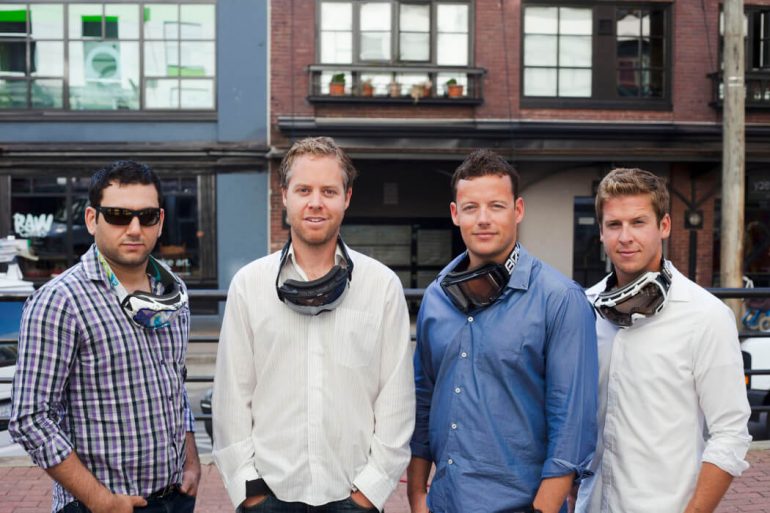In Vancouver, the past year has seen the acceleration of a rapidly maturing tech industry.
Since last December, the upstart city has produced a near-unheard-of eleven billion-dollar companies – including several that have clinched the coveted “unicorn” status – and reinforced its reputation as a hotbed of tech talent.
Although Vancouver’s tech industry has been growing fast over the last decade, it’s no coincidence that multiple startups have flourished simultaneously. Increasing recognition from the media and investors has contributed to those recent successes – but more than anything, these superstar companies have been buoyed by the willingness of others in the Vancouver tech scene to help and finance their own.
Nowhere is this more evident than in the story of EdTech giant Thinkific.
One of Vancouver’s newest billion-dollar companies, Thinkific is a cloud-based software platform that enables entrepreneurs and established businesses to create, market, and sell online courses. During the pandemic and beyond, the platform has been a go-to resource for many looking to share their expertise and allow others to reskill. The company made headlines in late April after raising $160 million in its Toronto Stock Exchange debut, increasing its value to a cool $1.25 billion, and confirming Thinkific’s status as an invaluable tool for educators.
Much ink has rightfully been spilled documenting its rise to success, starting with the company’s 2012 genesis and ending with its public listing. But the real story about Thinkific’s journey begins much earlier.
Like the ten other Vancouver companies that achieved a billion-dollar valuation in the past year, Thinkific is the beneficiary of the thriving local tech scene, where smaller acquisitions and exits have created the foundation for new businesses to receive their deserved acclaim. Both mentorship and money from previous wins continue to flow back into the community, funding fresh ideas and helping the city’s tech scene snowball into the avalanche of victories now recognized globally.
With the genealogy of companies so publicly evident, it’s easy to trace back the lineage of Vancouver businesses – and Thinkific is the archetypal local story. Following Thinkific’s trail from seed to success offers a roadmap for the Vancouver tech scene’s maturity, and a reason why so many Western Canadian companies are rocketing toward international success.
More than that, however, outlining Thinkific’s path offers an insight into where the Vancouver ecosystem may be headed in the future – and why founders and investors would be wise to take note.
Recon Instruments: the beginning of the beginning
Before Thinkific, there was Recon Instruments.
In September 2006, four enthusiastic MBA students at the University of British Columbia – Hamid Abdollahi, Dan Eisenhardt, Fraser Hall, and Darcy Hughes – were stuck on a school project. Tasked with creating a product for their technology entrepreneurship course, they selected Eisenhardt’s pitch to create a heads-up display swim goggle that would count laps and show the clock. It was a bold idea. Not only would it be one of the first attempts at commercializing augmented reality, but the team would also have to pack all the electronics into a tiny housing, and make sure it was waterproof.
A whiz with modelling and computer-aided design software, Abdollahi was instantly drawn to the idea.
“I immediately visualized what something like that would look like, and we got together and formed a team to investigate the commercialization of a product like that,” he said.
“We realized that Google co-founder Sergey Brin basically just popped up to our booth. And then we realized that they were actually hiring all these PhDs to do Google Glass later on.”
– Hamid Abdollahi
Not long after, the students ran into a bigger issue. In the break between the two school terms, they discovered that there was already an existing patent for their idea, which would block them from creating the swim goggles they’d designed. Rather than scrap the whole thing and start again, the four opted to change course and make something better. Pivoting their technology to snow sports, they focused their efforts on creating a ski goggle that would show live activity metrics and GPS, all while the wearer was on the slopes.
“As a 2006 student project, we got a pretty good mark on that course,” Abdollahi recalled. “And then most of the teammates went back to their industries, as they were working in different companies.”
Not satisfied with just an excellent grade, Abdollahi saw the potential in the product and wanted to keep developing the idea.
“In 2008, I called Dan to come back and join the team, and start to seriously commercialize it this time,” he said. “In the seven years between 2008 and 2015, there were challenges, and ups and downs. That multidisciplinary engineering team … grew to a team of nearly 75 people … spanning from R&D, optics, software engineering, hardware engineering, firmware engineering, to mobile. It was a fairly challenging engineering problem in itself. But on the business side, it’s probably one of the very first highly adopted consumer products in that space, as a mobile AR.”
In 2008, when the first smartphones were lauded for their processing power, Recon’s ski goggles were operating at a similar strength. Miniaturization was one of the company’s fortes, and, at one point, Recon could claim the title of having made the smallest Android-running computer on the planet.

The startup’s biggest contribution, though, was its impact on AR. Recon’s first heads-up display was released commercially in October 2010 – roughly a year and a half before Google introduced its Google Glass – giving the company unofficial bragging rights as the genesis of the wearable-AR boom of the present, including Facebook and Apple’s hotly-anticipated smart glasses.
“We used to go to the Consumer Electronics Show in Vegas, starting from 2010,” Abdollahi said. “In 2011, we realized that Google co-founder Sergey Brin basically just popped up to our booth. And then we realized that they were actually hiring all these PhDs to do Google Glass later on.”
Recon’s potential didn’t go unnoticed. At around the same time as the company launched its ski goggles, tech icon Intel was making a big bet on wearables, working on everything from a high-fashion smart cuff to the Intel Curie Module: a low-power device designed to turn items from rings, bags, pendants, glasses, and more, into tech.
In 2015, Intel acquired Recon for an undisclosed amount.
Recon’s flagship product, the Recon Jet – polarized sunglasses for activities such as running or cycling – was released the same year, to mixed reviews. Though some praised the company for commercializing the first fitness-focused heads-up display, critics panned aspects such as GPS lag, complex interface, and insufficient battery life.
Two years later, Intel shuttered its Recon division.
Going separate ways, but giving back
After Recon locked its office doors, each of the four founders moved onto new projects – but all maintained strong ties with the Vancouver tech ecosystem.
For Eisenhardt, the end of Recon gave him the opportunity to pursue his initial dream: the augmented reality swimming goggles he had first pitched to his MBA class. That idea became Form Athletica, smart goggles that provide accurate, automated, real-time performance metrics in the pool, with Eisenhardt as its founder and CEO.
“Immediately upon selling Recon, Dan and I decided we were going to build the fund we wished we had, become the investors that we wished we had – what our idealistic selves thought an investor could be.”
– Fraser Hall
Headquartered in Vancouver’s tech-centric Yaletown neighbourhood, Form Athletica is one of the premier AR companies based in the city, which hosts one of the largest VR/AR ecosystems on the planet. In addition to running his own company, Eisenhardt also invests in other Vancouver businesses.
Hughes, meanwhile, helped co-found Vancouver-based SKIO Music, which focused on helping musicians create remixes by changing the way that licensing and copyrighting operated. Now, he concentrates on providing private equity to companies with roots in FinTech, music-tech, sportstech, and media, and is an angel investor for a number of local businesses under Hughes International Pursuits.
Abdollahi is working on two different ventures. The first is a Vancouver robotics company named Novarc Technologies – whose product uses collaborative tech to weld together pieces of piping – where he is the co-founder and chairman. The second is a boutique tech incubator for early-stage startups, named Ignite Ventures. Ignite supports teams and founders in the software, e-commerce, deep tech, and machine learning space, amongst others. Through Abdollahi’s leadership, Ignite helps local Vancouver teams build a foundation that will give them a better chance at success.
While Eisenhardt, Hughes, and Abdollahi have all made contributions to the Vancouver tech industry, both financially and through their newly created companies, Hall’s work after Intel’s acquisition arguably has the highest public profile – not least because of his role in investing in new Vancouver billion-dollar company Thinkific.
New money, new unicorns
After Recon Instruments sold in 2015, Hall – along with Eisenhardt – co-founded the venture capital fund Rhino Ventures. From the get-go, the Vancouver-based business was designed to support Western Canadian companies. As well as providing the financial backing that organizations in a rapidly expanding tech hub need to succeed, Rhino’s mission statement is to offer the financial aid and mentorship that the pair felt was lacking from their investors at Recon, and help bolster the Vancouver ecosystem.
“We’d raised in the neighbourhood of $35 million for Recon,” Hall remembered. “That was over many, many rounds – micro rounds and larger rounds. And we did not have a great experience with our largest investor, nor did we really have a great experience with investors that came from Vancouver, which is definitely an overgeneralization. But we, in particular Dan [Eisenhardt] and I, were very frustrated that we thought that these investors were destroying value. They were just a distraction on the management team. They were guiding us in the wrong direction, they were causing all kinds of anguish, and mostly distracting from what we were trying to do.”
“So this was a problem that we simply weren’t willing to live with,” he continued. “Immediately upon selling Recon, Dan and I decided we were going to build the fund we wished we had, become the investors that we wished we had – what our idealistic selves thought an investor could be. And we immediately recruited Jay [Rhind], who’s a partner in the fund. And off we set.”

After raising more than $14 million for the first fund in 2015, $33 million for the second, and – two weeks ago – $123 million for their third, Rhino has become a renowned investor in some of Western Canada’s early-stage companies. The firm has already gained a reputation for picking wisely; of its 18 choices, Rhino’s varied portfolio features a number of exits and acquisitions, including Askott Entertainment, Beanworks, Sokanu, Grow Technologies (now part of ATB Financial), and Tutela.
Hall was well-placed to identify Thinkific as the next big thing. Rhino led or funded alone every round for Thinkific since it first invested, and was the lead order on its $1.25 billion initial public offering (IPO). In total, Rhino invested just under $3 million initially, which is worth around $181 million today.
Hall is also deeply involved in another up-and-coming Vancouver startup – one that further shows the level of integration and support within the local tech ecosystem. Alongside seasoned entrepreneur Aamir Baig and two other tech engineers, Hall co-founded the direct-to-consumer furniture business Article.
Now one of the city’s larger home-grown organizations, and one that’s already found traction across both the United States and Canada, Article has taken less than $5 million in venture capital – the majority of which came from Rhino. Significantly, Baig was one of the first people to invest in Recon – beginning the chain of financing that would flow into Thinkific.
For Hall, it’s interesting to consider the lineages through the Vancouver ecosystem, and how successes at one company lead to wins for others. In his view, up-and-coming companies benefit when current businesses do well, rather than trying to out-compete each other.
“Recon gave us a certain financial means and credibility to raise our first fund,” he said. “But even more importantly, it gave me and Dan this fire in our belly that something had to change. There’s no doubt that without Recon, there would be no Rhino. It’s so clear that Recon leads to Rhino, which leads to helping these businesses. We certainly can’t take credit for any of their success. All we can say is that we help them, and we provide financing at times, but, hopefully, the spirit of Recon is still alive and well.”
Building momentum
With the ecosystem’s appetite for investing in its own, Vancouver and its eleven billion-dollar companies look poised to continue the sector’s acceleration.
Half of those companies currently boast a multi-billion dollar assessment, including local startup Dapper Labs, which has almost single-handedly brought NFTs into the public eye with the success of its NBA Top Shot product and marketplace, and boasts a reported $7.5 billion valuation.
On the heels of these successes, executives will be granted new means to write angel cheques for up-and-comers, as well as provide mentorship, financing, and spin off new businesses.
In Hall’s view, Western Canada is about to enter a period of fast-tracked growth.
“It’s strange how untapped Vancouver is,” he said. “For one, it’s a fantastic place to live, despite housing costs. That is a real problem, I think, for tech in Vancouver. But we have great educational institutions. We have some great example companies, and some organizations that are spinning off great engineering talent. We’ve got the pioneering mindset here. We have access to capital markets, I think, more than many parts of the world. We get traffic from San Francisco-based financiers who find this far easier to get to than New York – we’re in the same time zone, and it’s a shorter flight.”
“I think the world of finance is looking for places like Vancouver,” he continued. “More and more I get calls from VCs from outside of our region saying, ‘Man, there’s some good companies out there. Tell me more. Should I be up there? Should I be poking around?’ Yeah, you should be. There’s a lot coming out of here. So I think we’re at this tipping point where there’s a lot percolating under the surface, a lot of great companies that are building real big businesses here. And I think we’ll see more of them in the coming short few years.”

